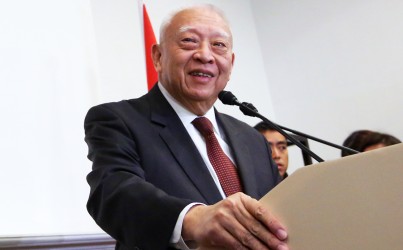Occupy Central
Occupy Central is a civil disobedience movement which began in Hong Kong on September 28, 2014. It calls on thousands of protesters to block roads and paralyse Hong Kong's financial district if the Beijing and Hong Kong governments do not agree to implement universal suffrage for the chief executive election in 2017 and the Legislative Council elections in 2020 according to "international standards." The movement was initiated by Benny Tai Yiu-ting (戴耀廷), an associate professor of law at the University of Hong Kong, in January 2013.
Umbrella Movement
The Umbrella Movement (Chinese: 雨傘運動; pinyin: yǔsǎn yùndòng) is a loose political movement that was created spontaneously during the Hong Kong protests of 2014. Its name derives from the recognition of the umbrella as a symbol of defiance and resistance against the Hong Kong government, and the united grass-roots objection to the decision of the Standing Committee of the National People's Congress (NPCSC) of 31 August.
The movement consists of individuals numbering in the tens of thousands who participated in the protests that began on 28 September 2014, although Scholarism, the Hong Kong Federation of Students, Occupy Central with Love and Peace, groups are principally driving the demands for the rescission of the NPCSC decision.
The movement consists of individuals numbering in the tens of thousands who participated in the protests that began on 28 September 2014, although Scholarism, the Hong Kong Federation of Students, Occupy Central with Love and Peace, groups are principally driving the demands for the rescission of the NPCSC decision.
POST OCCUPY CENTRAL - DAY 36:
Full coverage of the day’s events
National security laws have place in Hong Kong, says former chief executive Tung Chee-hwa
Hongkongers should stop acting like "outsiders" in their own homeland and start appreciating the importance of national security, the city's first chief executive Tung Chee-hwa said.
Police arrest more activists over Occupy protests
People Power members Albert Chan Wai-yip, Tam Tak-chi and Raymond Chan Chi-chuen were arrested for inciting others to participate in unlawful assemblies, but the former two were also arrested for participating in unlawful assemblies.
All were released without any charges.
Albert Chan criticized the government for exercising political control through the arrests.
In addition to reporting to the police, he said he filed a report against police, including commissioner Andy Tsang Wai-hung, for power abuse and the seven officers who beat up protester Ken Tsang Kin-chiu.
Tung hails policy address
Former chief executive Tung Chee-hwa said the policy address delivered by Leung Chun-ying last week has adequately addressed major issues in Hong Kong.
Tung, who is also the vice chairman of the National Committee of the Chinese People's Political Consultative Conference, urged Hongkongers and lawmakers to respect Basic Law and the decision made by the National People's Congress on August 31, 2014.
He noted that Hong Kong is part of China and the sovereignty of the country should never be challenged. The former leader of the SAR said it is important to implement the system "one person one vote'' and not to challenge the decision that was firmly made.
Tung said he will persuade the pan-democrats to support the political reform.
Security law calls against Basic law: Alan Leong
Civic Party leader Alan Leong Kah-kit has described the call to adopt the mainland's national security laws in the city as "totally alien" to the "One Country, Two Systems" principle set out in the Basic Law.
He said former chief executive Tung Chee-hwa, now as a state leader, does not understand how the principle works.
Earlier, Tung had responded to Ng Chau-pei's suggestion, saying that Beijing has the legal right to introduce security laws to Hong Kong.
Ng is a local delegate to the National People's Congress.
However, Leong said Article 23 of the constitution has clearly delegated the power to the Special Administrative Region to make national securities laws applicable to itself.
He also said the reason they back the idea is because they want activists to be branded "dissidents".
Emily Lau blasts plea to Beijing for security law
Democratic Party chairwoman Emily Lau Wai-hing has criticized a local deputy to the National People's Congress, Ng Chau-pei, who plans to propose to the central government to implement its forthcoming national security laws to be implemented here.
She said Ng's proposal violates the One Country Two Systems Principle.
"I just find it staggering that a member of the NPC to make such a recommendation, which I think would be in breach of the Basic Law," she said.
Michael Tien sees no need for security law here
Pro-government lawmaker Michael Tien Puk-sun has brushed aside suggestion that the National Security Law to be introduced to the local legislation.
He said said he does not agree with the bid to introduce the law and does not see the need to impose Article 23 immediately as well.
"I believe if there is evidence that clearly shows the national security is at risk,the majority will support passing of Article 23 to deal with that, rather than a PRC law introduced and implemented in Hong Kong," Tien said.
Beijing can implement mainland laws in HK: Tung
Former Chief Executive Tung Chee-hwa said Beijing have the rights to implement mainland laws into Hong Kong, according to Basic Law.
He was responding to suggestion by NPC local deputy Stanley Ng Chau-pei to ask Beijing to implement national security laws in the SAR.
Tung added that Article 23 will be introduced as this is the responsibility of Hong Kong.

沒有留言:
張貼留言